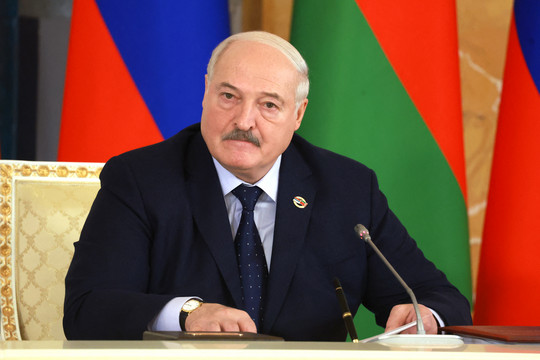Four years after Lukashenko was self-declared the winner of the fraudulent presidential election and the suppression of peaceful demonstrations with extreme brutality, repression against journalists and civil society has become worse in Belarus. In March 2023, the IFJ-EFJ affiliate in the country, BAJ, was labelled an ‘extremist’ group by the regime, meaning that anyone who engaged in its activities could face up to 10 years in jail. The BAJ is the only independent and representative organisation of journalists and media workers in the country.
37 journalists and media workers remain behind bars
According to BAJ’s data, 37 journalists and media workers, – 10 women and 27 men – are imprisoned in Belarus. The country’s courts continue to impose long sentences on those who dare to speak up against the regime or who deviate from the official narrative. They are labelled ‘extremists’ – and clearly targeted because of their journalistic work.
Among the most notorious cases is that of Maryna Zolatava and Ludmila Chekina, editor-in-chief and manager of independent media tut.by, who were sentenced to twelve years in jail in March 2023 in a ‘closed-doors’ trial. Zolatava was convicted of “inciting social hatred” and creating “disseminating content calling for actions undermining national security”, while Chekina was charged of “tax evasion”, “organising incitement of social hatred” and “disseminating content calling for actions undermining national security”. Both have been behind bars since 18 May 2021, when law enforcers raided the media office and detained numerous staff members.
In the same line, Belsat TV correspondent Katsiaryna Andreyevawas convicted of treason in June 2022 and is serving a prison sentence of eight years. Andreyeva was detained in November 2020 while livestreaming a peaceful protest in Minsk against Lukashenko’s continued rule. The journalist was serving a two-year jail term for “organising an illegal protest” and was due to be released on 5 September, 2022.
Journalist Larysa Shchyrakova was sentenced to three years and a half in a general-security penal colony on 31 August, 2023. Shchyrakova was accused of discrediting Belarus, and of promoting extremist activities, under the form of allegedly disseminating disinformation online. The journalist has been behind bars since 6 December 2022, when the authorities ordered a home search.
These are only four stories of the 37 journalists and media workers that are behind bars in Belarus.
Increased harassment against exiled journalists
In August, the BAJ denounced growing raids by the police on the residences of exiled journalists. A tactic designed to exert leverage on journalists, who were forced to flee the country, through pressuring their families. On 16 May, authorities searched the home of exiled BAJ’s deputy chairperson, Barys Haretski, and opened a criminal case against him. The union also warned about the confiscation of journalist Dzmitry Kazakevic’s apartment by the State, which will be sold as “compensation for damage caused by sanctions”. The IFJ and the EFJ demand the Belarus authorities abandon these repressive tactics. Journalists’ unions the world over stand in solidarity with journalists, who have been forced into exile.
BAJ chairperson Andrei Bastunets said: “37 journalists are behind bars. That's not just a number to lots of people, but I know almost all of them. Many of them are my friends. I could not even imagine in my worst dreams that so many of my acquaintances and colleagues would end up in prisons and colonies. Even four years after the protests were crushed, repression continues unabated [...].
“Currently, there are ten women journalists behind bars in Belarus. Ksenia Lutskina – 8 years in prison, Marina Zolotova – 12 years, Lyudmila Chekina – 12 years, Valeria Kostyugova – 10 years, Irina Levshina – 4 years, Irina Slavnikova – 5 years, Katerina Andreeva – 8 years and 3 months in prison, Larisa Shchiryakova – 3.5 years, Elena Timoshchuk – 5 years, Anastasia Matyash – 2 years in prison. Journalists are not criminals. They pay with their personal freedom for everyone's freedom of expression,” Bastunets concluded.
The IFJ and the EFJ said: “Lukashenko's regime has been crushing free speech and stripping journalists of their freedom for too long. We demand the immediate and unconditional release of our unjustly imprisoned colleagues, and express our solidarity with those who were forced to flee their country and still have to live in fear abroad. Belarusian authorities must stop harassing and intimidating journalists”.
The global trade union movement expressed its solidarity with workers in Belarus and urged governments and employers to help put an end to human and trade union violations in the country.

